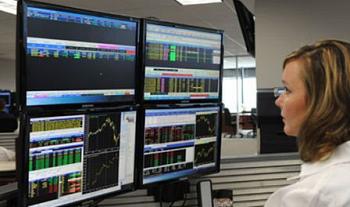You can succeed as a Forex trader and here’s how
The phrase “Forex trader” conjures up movie-type images of Matt Damon and Leonardo DiCaprio types on the trading floor screaming buy and sell instructions on which millions of dollars can be gained or lost. Is it really that way?
A quick web search will show you a multitude of apps, platforms and websites where anyone can become a Forex trader from their own home. Another search will tell you that Forex trading for beginners is simple and there is good money to be made, while yet a third will tell you that nine out of ten new traders lose money and give up.
They can’t all be true – or can they? Here are the facts:
- There’s a whole range of platforms, smartphone apps, websites and brokers to open up the world of Forex trading to anyone – all you need is a bank account and an internet connection.
- Open up your copy of the New Testament and you will be able to read about the money changers in the Holy Land – these were earliest Forex traders, and people have been making a profit out of it for 2,000 years or more.
- Some say that 95 percent or more of new Forex traders come out on the losing side and give up. Not because Forex has suddenly become unprofitable, but because they do not know what they are doing.
If the above tells you anything, it is that Forex trading is not some magical money-making activity that you can leap into with minimal planning and preparation. That is exactly the mistake that so many would-be traders make, and is where those scary statistics come from.
Learn about Forex
Know your enemy. So said Sun Tzu in his military text The Art of War in around 400BC. The advice remains relevant today in all manner of contexts. While the Forex markets might not be your enemy as such, there is certainly a degree of battle in trying to be smart enough to predict what they are going to do and use their predicted shifts to your advantage. There is a wealth of Forex trading tutorials and similar educational articles on the web that can give you a head start in knowing your enemy and getting you off on the right foot.
These will run you through the basics of what Forex is all about, how the market operates and some of the fundamentals you need in place, such as a suitable online trading account and, ideally, a reliable Forex broker.
The tutorials also give some guidance on basic trading strategy. So many people dive into Forex trading with only the most rudimentary idea of what they are doing and why – you soon understand why such a large proportion of novice traders end up getting their fingers burned.
Why trade Forex?
As far as trading is concerned, most of us have a few shares and have bought and sold a little on the stock market. Even before the internet made it so easy, this kind of trading was seen as something reasonably straightforward and accessible, even if we were having to do it by telephone, in person or even using the good old fax machine (remember those?).
Yet Forex was seen as something for the specialists. Perhaps it is because currencies seem somehow less tangible than company stocks, or maybe it is because the Forex market has so many factors influencing it. Either way, Forex trading is now as accessible as any other sort, and here’s why you should seriously consider it.
The market is huge. Average daily trading is around $3 trillion – that’s four times the size of all the other equity and futures traded worldwide put together. And whatever anyone might try to tell you, in this context, size matters. The larger a market, and the more people in it, the more liquid it is and the lower the likelihood of a catastrophic crash.
It also has other benefits, in as much as you can make good money quickly, and yet you do not need a large investment fund to get started.
Approach with caution
Despite all these positives, always keep that 90 percent figure in mind. People come out losers due to a bad strategy, muddled thinking and making the false assumption that they have mastered the basics, or worse, that they don’t need to.
Most of the popular platforms, such as MetaTrader 4, have a facility whereby you can open a demo account and practice trading without actually investing real money. Use it and learn from it. When you do start trading, keep it simple and keep it safe. If you never have more than two percent of your overall trading budget at stake on any one deal, what is the worst that can happen? Certainly nothing disastrous that will bring your trading career to a premature end and consign you to the ranks of the 90 percent.
Know your enemy, spend time practicing and when you do start trading, do so with a risk management perspective in mind. Follow those three rules, and you will not go far wrong. Good luck!
Comments
There are 0 comments on this post













